I arrived on the island on November 20th to a
surprisingly cold and windy morning. I immediately realised I hadn’t packed the
right clothes for the trip. I wasn’t expecting it to be hot but I didn’t expect
it to be so cold either! I travelled on a weekend to give myself time to rest,
prepare, and discuss the appointment schedule for the week with Fabiola, the
incredible woman founder and director of my host organisation, Earth Medicine.
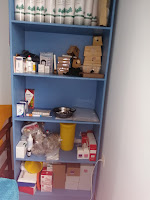 |
| Acupuncture cabinet at Earth Medicine |
Earth Medicine had just moved to new premises, a huge house in Mytilene, the island's capital, and it now boasted three different rooms where treatments could be done. In one of the rooms, I found a dedicated acupuncture cabinet where all my needles and moxa equipment had been lovingly placed for my arrival. I was warmly welcomed by people I had met back in August and the first week was already fully booked with treatments. During my stay, there were many people coming to offer a hand, all of them from Germany: a photographer who has been documenting the lives of refugees in Europe for some time, four young women of Afghani and Syrian descent who have started an organisation dedicated to help people from these countries, a young physiotherapist, two homeopaths- one of them I had met in August, and a young woman who was driving the blue van used to transport people from the camp to the clinic and back, including wheelchair users.
In contrast with my first visit, when we were sweating constantly in the intense heat and people living in the camp were unable to sleep because of this, this time the temperature at night was very low and we had strong winds and stormy weather for many days. This, and the shorter days, had a definite impact on the refugees’ physical and mental wellbeing and made their symptoms even more severe and even more urgent. There were several older women from Syria with the exact same presentation of water accumulation in the whole body that produced severe pain and soreness everywhere, their pain was so intense that they could hardly be touched. There were also men and women in their 40’s and 50’s with dangerously high blood pressure and sugar levels – often occurring simultaneously- that no amount of medication seemed to be able to control. Amongst the refugee population, these conditions are not a result of any dietary excess but purely a consequence of severe trauma and of the high stress and uncertainty that comes with living in a refugee camp. I understood that without treating the stress and trauma already lodged in these bodies, the pain, the sugar levels, and the blood pressure could not be forced to become stable. We saw some – often dramatic- improvements in most of these cases as a result of a multidisciplinary approach which this time involved homeopathy, massage, scalp and body acupuncture, and loads and loads of moxa.
 |
| Severe leg swelling- |
 |
| Severe leg swelling after a few sessions |
 |
| An extremely weak young man having moxa treatment |
I have found that a certain combination of scalp acupuncture lines can be highly effective to reduce several of the most common PTSD symptoms. I learned these lines from Dr Suzanne Rubidoux and are part of the system developed by Dr Lin Xue Jian for “Psychosomatic disorders”. Most of these are found on the area over the frontal cortex of the brain and have a strong calming and grounding effect that makes someone who is highly wired, unable to settle, very depressed, anxious or even very angry, feel more peaceful, relaxed, and even content. I used these lines on most of the people I treated and they invariable helped promote relaxation, peace, and good sleep. In several cases they also reduced anxiety and depression, reduced the frequency of panic attacks and of angry outbursts. This was of course no antidote to the harsh reality that people are living but I could see how the reduced stress response offers access to other levels of a person system so that we can promote more balance and wellness in the internal body.
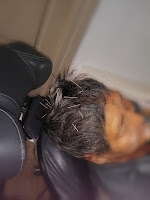 |
| Scalp acupuncture used alongside body acupuncture |
 |
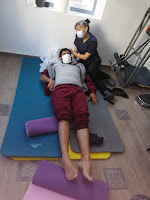 |
I was able to give 187 treatments to 30 people during my three weeks in
Lesvos. This is thanks to a team effort of all those who were working with
Earth Medicine while I was there- driving people, making appointments, cooking
meals for all of us, interpreting for us, and finding out who had friends in
the camp who could benefit from treatments-, as well as those who contributed
with their donations.
I have had a lot of praise for doing this work, for which I am thankful. However, I feel I have gained a lot from this, maybe even more so than I have given. For a start, I have literally felt my heart expanding, and I have felt more alive and human since my first trip to Lesvos than I have ever felt. It is a wonderful thing to feel connected to other human beings to the point of realising we are all exactly the same, even if this connection is brought on by their deep suffering. Within this connection, every person I have met has transformed into a family member which means I now have a place that is full of my mothers and grandmothers, my brothers and sisters, my children, nephews, and nieces. The success of the Earth Medicine project, with which I am so proud to collaborate, lies in the understanding of our common humanity. Rather than “charity” it offers “community”. A place where we all belong and exchange what we have, where we are just humans interacting with other humans rather than white people with brown people, Christians with Muslims, rich with poor, therapists with sick people.
 |
 |
 |
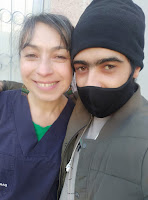 |
I have a friend who always says that if something amazing is happening where we
are, chances are it is happening in many other places already. I know he is
right and I hope that we will all see this grow during our lifetime. My wish is
that one day we will all find each other in this new place, where we are all
part of the great human family, where we look out for each other, where your
pain becomes mine and so does your joy.
With gratitude and love,
Sandra
If you would like to donate to Earth Medicine to support their work in Lesvos, please click here

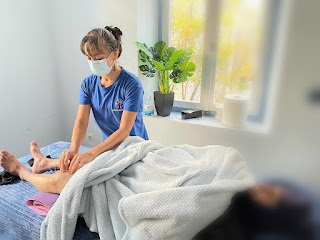
No comments:
Post a Comment